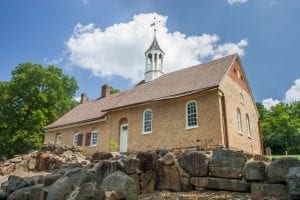Moravian Funeral Service Rituals

Moravian funerals are similar to many other Christian traditions in that they are characterized by both grief and joy. Members of this faith grieve the loss of loved ones, but they believe that through salvation eternity is ever hopeful. Moravian believers are often heard saying that the deceased has “entered into the immediate presence of the Savior.” This is an indication of their belief that life and death are both blessings.
Moravian funerals share many similarities with other Christian funeral traditions. However, one unique characteristic of a Moravian funeral is the reading of the Lebenslauf of the deceased. The Lebenslauf (German for “life path”) is a short account of the deceased’s life. Much like a memoir, it is shared with the members of the congregation and funeral visitors. It includes a brief account of the deceased’s faith, and it is meant to be an encouraging example to those who are left behind.
Music is a very important part of Moravian funeral traditions. Generally speaking, a volunteer band will play music at the gravesite, and the choir may also be asked to sing. Even bishops and other leaders of the church take time out to play in the band to display their encouragement and comfort for mourners. Funeral services traditionally being in the church sanctuary, and they are followed by a procession to the cemetery for interment. In some churches, the cemetery is visited again annually at Easter as a form of remembrance for those who have died.
Similar to other traditions, Moravians focus on the simplicity of burial grounds. They believe in uniform, plain grave markers and inscriptions to emphasize the equality of all human beings. The stone will typically be inscribed with the name, date of birth and death, and a quote or scripture. Moravians do not use the term cemetery. The term graveyard is used but the term “God’s Acre” is the most common term for a formal Moravian burial ground. In “God’s Acre” bodies are placed in the next open plot rather than together with family members. Traditional burial grounds may be divided into separate sections for gender and marital status. Traditional “God’s Acre” burial grounds are not available in all areas so Moravians will use a conventional cemetery and may use a family plot. Today’s Moravians may also opt for cremation.
The current pastor of the deceased’s home church presides at the funeral services, although other pastors may also be asked to participate. The church organist usually plays music during the funeral service.
Pre-planning for a Moravian funeral is done whenever possible, and the deceased often makes decisions about the service beforehand. They may elect to have their services in the sanctuary or chapel of the church, at the graveside, a funeral home, or another location.
The Bible is an integral part of worship in the Moravian church. As such, scripture readings are an important part of church functions. They are traditionally read at funeral services as well, and favorite passages of the deceased may be used as part of the event. Favorite hymns and songs are also played or sung at the funeral service. Each service is unique, so the length depends on the readings and musical selections that are chosen.
| Moravian Funeral Reference Guide | |
|---|---|
| Length of Service | 30-60 minutes |
| Flowers? | Yes (See our Sympathy Flowers) |
| Food? | Yes |
| Dress Code? (Men/Women) | Traditional Costumes or Dark & Conservative / Men: Jacket & Tie |
| Recording Devices? | Only with permission |
| Source of Readings? | King James Bible (Traditional: Kralice Bible) |
| Open Casket? | — |
| Return to Work? (Days) | — |
| No. of Days to Mourn? | — |
| Embalming? | Embalming is permitted. |
| Cremation? | Cremation is permitted. |
| Body/Organ Donation? | Up to the individual. |